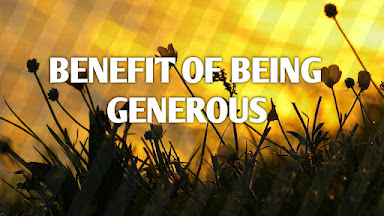TOP BENEFITS OF BEING GENEROUS
Introduction
Generosity is a fundamental human trait that transcends cultural, geographic, and social boundaries. It is the act of giving without expecting something in return, and its benefits extend beyond the recipients of our kindness. Being generous not only positively impacts others but also enriches our own lives in numerous ways. In this article, we will explore the top benefits of being generous, highlighting why it is a virtue that should be cultivated and celebrated.
1. Enhanced Well-being and Happiness
Generosity has been linked to increased feelings of well-being and happiness. When we give, our brain releases oxytocin and dopamine, often referred to as "feel-good" hormones. These chemicals trigger positive emotions and reduce stress and anxiety. The act of giving, whether it's donating to a charity, helping a friend in need, or simply lending a hand to a stranger, can boost our mood and create a sense of fulfillment.
2. Strengthened Social Connections
Generosity fosters stronger social connections and bonds. When we give, we are actively engaging with others, demonstrating our willingness to help, support, and connect on a deeper level. Generous individuals tend to attract like-minded people, creating a network of friends and acquaintances who value compassion and selflessness. This, in turn, can lead to more meaningful and enduring relationships.
3. Increased Empathy
Practicing generosity often leads to an increase in empathy. As we become more attuned to the needs and struggles of others, our capacity to understand their emotions and experiences grows. This heightened empathy not only enables us to provide more effective assistance but also strengthens our ability to relate to others, ultimately making us more compassionate individuals.
4. Boosted Self-esteem
Generosity has a remarkable way of boosting self-esteem. When we give, we feel a sense of purpose and accomplishment. Knowing that we can make a positive impact on someone else's life, no matter how small, reinforces our self-worth. As a result, we develop a healthier self-image and increased self-confidence.
5. Improved Physical Health
Surprisingly, generosity has been linked to improved physical health. Acts of kindness and altruism can lower stress levels, reduce inflammation, and enhance the functioning of the immune system. People who give tend to experience fewer health issues and may even have a longer lifespan. In essence, being generous is a form of self-care that benefits the giver as well as the recipient.
6. Sense of Fulfillment
Generosity provides a deep sense of fulfillment that material possessions cannot match. Material wealth and possessions may bring temporary happiness, but it often fades quickly. In contrast, the fulfillment derived from helping others and making a positive impact is enduring. Knowing that we've made a difference in someone's life can be a source of long-term satisfaction and contentment.
7. Encourages a Culture of Giving
Generosity is contagious. When we practice it, we inspire others to do the same. Our acts of kindness can create a ripple effect, encouraging friends, family, and colleagues to be more generous. This cultural shift towards giving can lead to more compassionate and harmonious communities, both locally and globally.
Conclusion
The benefits of generosity are wide-reaching and deeply ingrained in human nature. The act of giving not only improves the lives of those on the receiving end but also enriches the giver's life in ways that go beyond material wealth. Enhanced well-being, strengthened relationships, increased empathy, improved self-esteem, better physical health, a profound sense of fulfillment, and the promotion of a culture of giving are just some of the top benefits of being generous.
In a world often characterized by division and self-interest, cultivating and celebrating generosity is a powerful way to counteract these tendencies. It reminds us of the profound impact we can have on the lives of others and reinforces the importance of empathy, kindness, and selflessness in our interactions with the world. Ultimately, generosity is not just a virtue; it's a pathway to a happier, healthier, and more connected existence.




Comments